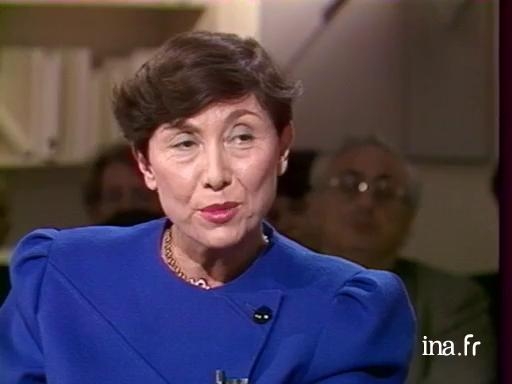Bernard Pivot
And now Julia Kristeva.
You too, you were born in Bulgaria and you've been working in France since 1966.
You are a psychoanalyst.
You've been - I don't know if you still are - a linguistics professor at the University of Paris VII.
Also, you've written books on language, on literature, on behaviour,
and your latest book, "Etrangers à Nous-Mêmes", published by Fayard.
Anyways, we're going to talk about books later on,
but I'd like to ask you, all three of you since you were all born abroad, to quickly describe your careers.
So let's start with you, Julia Kristeva.
So, you were born in Bulgaria, and when you arrived in France, you were approximately 25 years old.
So, question: why did you leave Bulgaria?
Why did you choose France?
Julia Kristeva
Well, I often respond to this question by saying that I'm in France thanks to general de Gaulle,
because he had a wonderful idea, like many of his ideas,
which was for Europe to stretch out from the Atlantic to the Ural,
and, along these lines, he gave scholarships to young Bulgarians
which, unfortunately, were rarely used by the authorities
since they were given to old Bulgarians who didn't speak any French.
As it turns out, on the night before Christmas, in 1965,
the director of the Institute of Literature, where I already was at to work on my thesis, left for Moscow,
and my research director decided to send me to the French embassy
to see if I could pass the exam, which I did,
and so I arrived in France with 5 dollars in my pocket
and a scholarship that was only to begin a month later,
to proceed with my studies, therefore, and to continue preparing my thesis.
Bernard Pivot
And why did you decide to stay in France?
Julia Kristeva
Well, I was raised in a very Francophile household.
I had a very favourable impression of France.
Bernard Pivot
You spoke French.
Julia Kristeva
I spoke French,
but more than that, I found a bursting intellectual atmosphere in France,
something exceptional that I obviously never found in my country,
but I also think that it's something rather rare in the Western world.
It was a few years before 1968,
It was a totally exciting and stimulating atmosphere for me.
And without really having decided to stay in France,
I think that, in the end, this admiration for French culture
and the possibilities that were available to me led to my decision.
Bernard Pivot
In other words, if you felt a cultural shock,
was it a beneficial shock to you, when you arrived in Paris?
Julia Kristeva
There were many things.
Given this rather favourable image that I had of France.
I was quite amazed but I also had a few disappointments which we might talk about a bit later.
But the positive things outweighed the negative.
So I decided to settle in France
and to obtain French citizenship, as a result of my intellectual admiration for France.
Bernard Pivot
I saw that thanks to the recent trip by the Bulgarian president of the republic, you accompanied him.
So then you went back to your country.
Were you shocked when you went back?
Julia Kristeva
Yes, yes, especially on the occasion of president Mitterand's visit with the students of the Sofia university.
So, I was one of those university students,
and I actually found that there was a very, very different atmosphere.
Everyone knows that the Bulgarian Perestroika is a bit slow,
but the students have an open, ironic, contesting state of mind with regards to the government,
which is really surprising.
And it was really a positive shock as well.
Bernard Pivot
Deep inside, did you say to yourself: "At this age,
if I had seen this when I was a student in Sofia, that's what I would have liked to see"?
Julia Kristeva
Absolutely.
Also, I was rather proud, nevertheless, to have been considered a French intellectual,
that could come back to her native country as a messenger of something that was coming from France,
something which the people over there counted on and still count on,
a sort of recognition of their national momentum and their desire to integrate into Europe.
Bernard Pivot
And do you still have family in Bulgaria?
Julia Kristeva
Yes, I have family in Bulgaria.

























